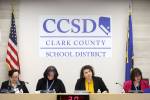COMMENTARY: Make collective bargaining public to avoid another sexual misconduct scandal at Clark County School District
An apparent epidemic of sexual misconduct allegations has the Clark County School District in crisis mode.
District officials are now scrambling to revise staff policies governing social media use and texting between students and their teachers in an attempt to make the learning environment less conducive to predatory behavior.
However, while more explicit district standards regarding teacher-student communications may be helpful in curbing the ongoing scandal, district officials must do more. Instead of being so singularly focused, the district must advocate to reform the processes which made such misconduct possible in the first place — namely, the secretive process of government-union collective bargaining which provided the ammo for predatory teachers to exploit.
Collective bargaining, as it pertains to the public sector, refers to the process through which the government and its organized workers negotiate for a new contract. Routinely, the collective bargaining process has systematically prioritized the job security of union members over the safety and security of students.
Behind closed doors, it’s all too easy for government representatives and union bosses to form a common front against the public — whether it’s the taxpaying public or, as in this case, the youth and families the district was established to serve.
Take for example Article 12, Section 10 of the current collective bargaining agreement between the school district and the Clark County Education Association, known colloquially as the “pass the trash” clause. It reads, in part:
“In the event civil or criminal proceedings are brought against a teacher and the teacher is cleared of said charge, all written reports, comments or reprimands concerning actions which the courts found not to have occurred, shall be removed from the teacher’s personnel file.”
While this provision is somewhat ambiguous — can a personnel file be wiped only if courts have become involved? — in practice it has allowed predatory teachers to be quietly transferred to other schools where new students can potentially be victimized.
Note that the Las Vegas Review-Journal’s recent “Broken Trust” series revealed that at least two of the teachers arrested during just the 2016-17 school year “had a known history of inappropriate behavior, according to police records,” yet were permitted to teach anyway.
This is powerful evidence that, for the safety of students and the common welfare of the community, the provisions of collective bargaining agreements need to be crafted publicly and transparently.
Critics of back-room dealings have advocated for transparency in collective bargaining for decades. The present district scandal merely provides the latest proof those calls are justified.
Current state law, however, exempts the bargaining process from Nevada’s Open Meetings Law.This means that all negotiations between the teacher union and the district — including those that led to the adoption of Art. 12, Sec. 10 — remain hidden from parents as well as the taxpaying public.
Sunlight on union negotiations would have likely precluded this type of clause, and anything as potentially damaging, from ever being adopted in the first place.
Clark County parents are already furious, given the failed educational outcomes the district provides to its students.
Thus, had they been present for the negotiations that resulted in the “pass the trash” clause, they likely would have rebelled against the union efforts to blindly prioritize the protection of its members over the safety of children.
And it’s all so needless: Several states where government unions enjoy powerful influence — Minnesota, Idaho, Texas, to name a few — have statutes which expressly mandate that all collective bargaining be made public.
Union officials frequently repeat the unfounded claim that sunlight on negotiations would undermine the bargaining process, but there’s no available evidence to support those claims. In fact, to assert that increased transparency will somehow undermine public policy is completely illogical. Isn’t more information always better than less information for policy-making purposes?
For these reasons, Nevada should eliminate the Open Meetings exemption to collective bargaining, thereby mandating that such negotiations be performed in public.
And to those unions who continue to resist transparency on baseless grounds, parents should ask one simple question: “What are you hiding?”
Daniel Honchariw is a policy researcher and analyst at the Nevada Policy Research Institute, a free-market think tank.




























